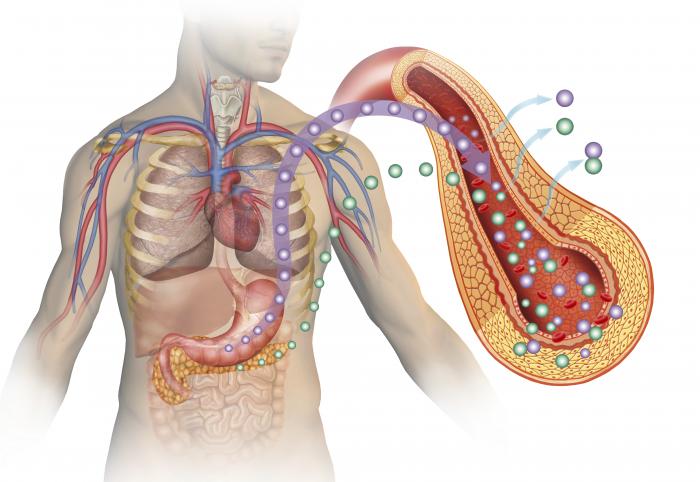
The beta cells that produce insulin are attacked by the body's immune system in type 1 diabetes.
If the trial is successful, it could herald the first "cure" for an incurable disease that affects 12.3% of Americans over the age of 20 and costs the nation $245 billion each year.
The key to the groundbreaking approach that has been proven effective in mice are beta cells, which the researchers explain are "critical" in type 1 and type 2 diabetes.
These cells are progressively lost in the wake of the disease due to programmed cell death, though the precise triggers for the deaths were previously unknown.
The researchers, from the University of Alabama at Birmingham (UAB) have been working on this research for over a decade in UAB's Comprehensive Diabetes Center.
They explain that their previous research has shown that high blood sugar causes an overproduction of a protein called TXNIP - which is increased within beta cells in response to diabetes. Too much TXNIP in pancreatic beta cells leads to their deaths, stopping the body's efforts to produce insulin and further promoting diabetes.
However, in animal models, the team has found that verapamil - used to treat high blood pressure, irregular heartbeat and migraine headaches - lowers TXNIP levels in beta cells.
In fact, in mice with established diabetes and blood sugars over 300 mg/dL, verapamil "eradicated" the disease.
The video below describes how verapamil works in the wake of diabetes:
Trial will not include immunosuppressive medications
Now, the UAB researchers have received a 3-year, $2.1 million grant from JDRF - the largest charitable supporter of type 1 diabetes research - to conduct a clinical trial in 2015 in humans.
Commenting on the upcoming trial, the research team says:
"That is a proof-of-concept that, by lowering TXNIP, even in the context of the worst diabetes, we have beneficial effects. And all of this addresses the main underlying cause of the disease - beta cell loss.Our current approach attempts to target this loss by promoting the patient's own beta cell mass and insulin production. There is currently no treatment available that targets diabetes in this way."
The trial, which will begin recruitment processes early next year, will include 52 people aged 19-45 within 3 months of receiving a type 1 diabetes diagnosis. They will then be randomized to receive either verapamil or a placebo for 1 year while continuing insulin pump therapy.
The participants will also be equipped with a continuous glucose monitoring system so they can measure their blood sugar continuously throughout the day.
A unique feature of this trial is that it will not include the use of any immunosuppressive or immune modulatory medications, which carry severe side effects and are used in most type 1 diabetes trials.
This trial is based on a well-known blood pressure medication that has been used for more than 30 years and is unlikely to have any severe side effects,, and this study is backed by a wealth of data in different mouse models and human islets.
Researchers are on the right track
The director of UAB's Comprehensive Diabetes Clinic and co-principal investigator of the study, will oversee all clinical aspects of the trial.
Fast facts about diabetes in the US
- 37% of people over the age of 20 have pre-diabetes, up from 27% a decade ago
- 29.1 million people - 9.3% of the population - have diabetes
- 8.1 million people - 27.8% of those with diabetes - are undiagnosed.
Learn more about diabetes
Currently, physicians can prescribe external insulin and other medications to lower blood sugar, but we have no way to stop the destruction of beta cells, and the disease continues to get worse.
If verapamil works in humans, "it would be a truly revolutionary development in a disease affecting more people each year to the tune of billions of dollars annually."
JDRF say they are funding this trial as part of their beta cell restoration research program, whose goal is to essentially find a biological cure for type 1 diabetes by restoring a person's ability to produce their own insulin.
The researchers want to find new drugs - different from any current diabetes treatments - that can help halt the growing, worldwide epidemic of diabetes and improve the lives of those affected by this disease.
Finally, the researchers have reason to believe that we are on the right track..
For more information or to enroll in the trial, contact Kentress Davison at UAB at 205-934-4112 or 205-975-9308.
In June of this year, researchers reported on a study from the University of Cincinnati in Ohio that demonstrated how a new therapy reversed new onset type 1 diabetes in mice. They did this by tackling a receptor on dendritic cells called TLR4.
References;
- UAB news release, accessed 6 November via Newswise.
- Additional source: CDC 2014 diabetes statistics report, accessed 6 November.
No comments:
Post a Comment